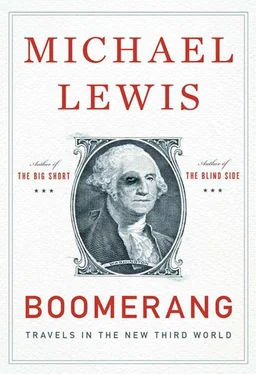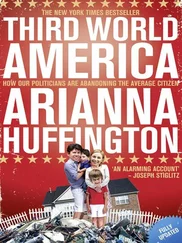There was another, bigger financial crisis waiting to happen—the only question in Kyle Bass’s mind was when. At the end of 2008, he thought Greece would probably be the first to go, perhaps triggering a collapse of the euro. He thought it might happen within two years, but he didn’t have a lot of conviction about his timing. “Let’s say it takes five years and not two,” he said. “Let’s say it takes seven years. Should I wait until I see the whites of their eyes before I position myself, or should I position myself now? The answer is now. Because the moment people think it [national default] is a possibility, it’s expensive. If you wait, you have to pay up for the risk.”
When we met, he had just bought his first credit default swaps on the countries he and his team of analysts viewed as the most likely to be unable to pay off their debts: Greece, Ireland, Italy, Switzerland, Portugal, and Spain. He made these bets directly with the few big Wall Street firms that he felt were least likely to be allowed to fail—Goldman Sachs, J.P. Morgan, and Morgan Stanley—but, doubting their capacity to withstand a more serious crisis, he demanded that they post collateral on the trades every day. The prices he paid for default insurance, in retrospect, look absurdly cheap. Greek government default insurance cost him 11 basis points, for instance. That is, to insure $1 million of Greek government bonds against default, Hayman Capital paid a premium of $1,100 dollars a year. Bass guessed that when Greece defaulted, as it inevitably would, the country would be forced to pay down its debt by roughly 70 percent—which is to say that every $1,100 bet would return $700,000. “There’s a disbelief that a developed country can default, because we have never seen it in our lifetime,” said Bass. “And it’s not in anyone’s interest to pay attention to this. Even our own investors. They look at us and say, ‘Yeah, you got subprime right. But you’re always out there looking for these extremely rare events and so you think they happen more often than they do.’ But I didn’t go looking for this position. I was trying to understand the way the world was working, and this came to me.” Now that he understood the way the world was working, he continued, he couldn’t see how any sane person could do anything but prepare for another, bigger financial catastrophe. “It may not be the end of the world,” he said. “But a lot of people are going to lose a lot of money. Our goal is not to be one of them.”
He was totally persuasive. He was also totally incredible. A guy sitting in an office in Dallas, Texas, making sweeping claims about the future of countries he’d hardly set foot in: how on earth could he know how a bunch of people he’d never met might behave? As he laid out his ideas I had an experience I’ve often had, while listening to people who seem perfectly certain about uncertain events. One part of me was swept away by his argument and began to worry the world was about to collapse; the other part suspected he might be nuts. “That’s great,” I said, but I was already thinking about the flight I needed to catch. “But even if you’re right, what can any normal person do about it?”
He stared at me as if he’d just seen an interesting sight: the world’s stupidest man.
“What do you tell your mother when she asks you where to put her money?” I asked.
“Guns and gold,” he said simply.
“Guns and gold,” I said. So he was nuts.
“But not gold futures,” he said, paying no attention to my thoughts. “You need physical gold.” He explained that when the next crisis struck, the gold futures market was likely to seize up, as there were more outstanding futures contracts than available gold. People who thought they owned gold would find they owned pieces of paper instead. He opened his desk drawer, hauled out a giant gold brick, and dropped it on the desk. “We’ve bought a lot of this stuff.”
At this point, I was giggling nervously and glancing toward the door. The future is a lot harder to predict than people on Wall Street would have you believe. A man who has been as dramatically right about the future as Kyle Bass had been about the subprime mortgage bond market collapse might easily fool himself into thinking he had a talent for being dramatically right about all sorts of other complicated things. At any rate, I was too interested in trying to figure out what had just happened in America to worry much about what was going to happen in the rest of the world, which seemed, at the time, a trivial matter. And Bass had more or less lost interest in what had just happened in America, because he thought what was about to happen all around the world was so much more important. I made my excuses, and took my leave of Dallas, and more or less dismissed him. When I wrote the book, I left Kyle Bass on the cutting-room floor.
Then the financial world began to change again—and very much as Kyle Bass had imagined it might. Entire countries started to go bust. What appeared at first to be a story chiefly about Wall Street became a story that involved every country that came into meaningful contact with Wall Street. I wrote the book about the U.S. subprime mortgage crisis and the people who had made a fortune from it, but began to travel to these other places, just to see what was up. But I traveled with a nagging question: how did a hedge fund manager in Dallas even think to imagine these strange events?
Two and a half years later, in the summer of 2011, I returned to Dallas to ask Kyle Bass that question. Greek credit default swaps were up from 11 basis points to 2300; Greece was just about to default on its national debt. Ireland and Portugal had required massive bailouts; and Spain and Italy had gone from being viewed as essentially riskless to nations on the brink of financial collapse. On top of it all, the Japanese Ministry of Finance was about to send a delegation to the United States to tour the big bond investment funds such as Pimco and BlackRock—to see if they could find someone, anyone, willing to buy half a trillion dollars’ worth of ten-year Japanese government bonds. “This is a scenario in which no one alive has ever invested before,” Bass said. “Our biggest positions now are Japan and France. If and when the dominoes fall, the worst, by far, is France. I just hope the U.S. doesn’t collapse first. All my money is bet that it won’t. That’s my biggest fear. That I’m wrong about the chronology of events. But I’m convinced what the ultimate outcome is.”
He still owned stacks of gold and platinum bars that had roughly doubled in value, but he remained on the lookout for hard stores of wealth as a hedge against what he assumed was the coming debasement of fiat currency. Nickels, for instance.
“The value of the metal in a nickel is worth six point eight cents,” he said. “Did you know that?”
I didn’t.
“I just bought a million dollars’ worth of them,” he said, and then, perhaps sensing I couldn’t do the math: “twenty million nickels.”
“You bought twenty million nickels?”
“Uh-huh.”
“How do you buy twenty million nickels?”
“Actually, it’s very difficult,” he said, and then explained that he had to call his bank and talk them into ordering him twenty million nickels. The bank had finally done it, but the Federal Reserve had its own questions. “The Fed apparently called my guy at the bank,” he says. “They asked him, ‘Why do you want all these nickels?’ So he called me and asked, ‘Why do you want all these nickels?’ And I said, ‘I just like nickels.’”
He pulled out a photograph of his nickels and handed it to me. There they were, piled up on giant wooden pallets in a Brink’s vault in downtown Dallas.
“I’m telling you, in the next two years they’ll change the content of the nickel,” he said. “You really ought to call your bank and buy some now.”
Читать дальше












